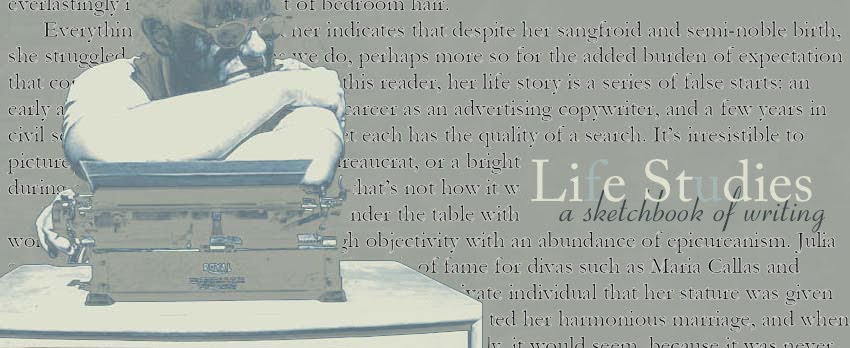I sit at the giant monitor scrutinizing two different roads, both flanked by buildings that would have been there in 1965. Did I ride past either in the back seat of my mother's car—one an auto repair, the other a formal wear shop? Which one led to Nannie's trailer?
Hers was on a corner, to the left of the road. In the middle of the night the furnace failed and soot fell on the interior like black snow.
The memory itself immolates, white and diaphanous as ash. It cannot bear my weight.
Was my mother away again on some long weekend date?
Was she, as I have been told, a prostitute?
* * *
My obsession with the past refuses to cow down long to the wisdom of my fifth decade. I can make it disappear for a little while, but it returns—a genetic tide.
Alone with my personality, often I long for my own, flawed kin.
Heavy smokers, as I recall.
The money-loaning, Sunday-phoning world around me doesn't fit my blood: all the adjectives that won't get used. I dig for their stories but rarely pull a gem.
I cannot stop describing what happened to me.
Nannie, topless, sitting at the foot of the bed. I said "I see your shopping bags!"
It was my first simile, and the family repeated it laughingly until Nannie died, on a cold Friday in December.
I was walking home from school and suddenly my mother's car pulled up alongside. Brian was in the passenger seat in his black leather jacket, staring at the windshield, and I knew something was wrong.
After a binge, she had vomited, ruby-black like coffee grounds, into a small plastic pail. Afterward, someone had just placed it in the bathtub.
I still have its unused twin.
She was a great cook, Nannie, and she is supposed to have studied with James Beard. They had a sandwich place in Arizona, for a while. Then she worked in the kitchen at Bungalow Inn, on Ridge Pike. We stopped by, once, and she took me into the back and gave me maraschino cherries from the massive, restaurant-sized jar.
She was talented, caustic, bigoted, profoundly unstable, and her verbal caricature was unsettlingly accurate. She smoked Kools from a jade-green plastic case. She drank crème de menthe straight, from a bottle in her bathroom closet.
Her oldest daughter drank herself to death at 37.
My brother Jimmy smoked himself to death at 55.
My father shot himself at 33.
My brother Bruce was a rock star.
I have a hard time concentrating.
Still, my mind drives along the roads of Jeffersonville, trying to remember the buildings then: the drive-in bank on the corner, across from the fire station, the S&H Green Stamps store, the animal hospital, and the tiny drive-up photo place.
Their lives were squeezed between Collegeville and Norristown like folders, and my feeble memory brings them back, reeking of smoke, hard-working and broke, pleasure-loving, self-destructive, violent, remorseful, fashionable, and tall.
Oh the colorful ashtrays!


